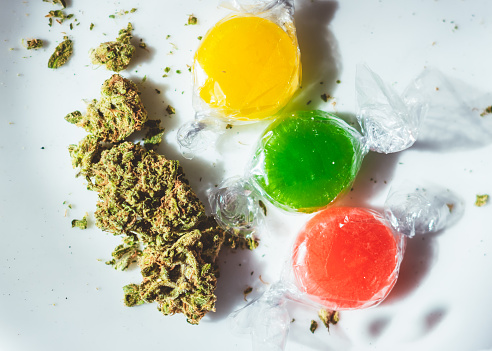
Cannabis edibles clear for legal launch before year-end
By Glacier Farmmedia Network
Food In Canada Food Trends Packaging Regulation Bake & Snack Food cannabis edibles Health Canada regulations Marijuana buds and plastic wrapped THC/CBD infused hard candies
Marijuana buds and plastic wrapped THC/CBD infused hard candies Food products containing cannabis are expected to be on the retail market by mid-December at the earliest under new federal regulations announced Friday June 15.
Health Canada announced amendments to the Cannabis Regulations will be published June 26 to come into force Oct. 17, laying out rules for legal production and sale of edible cannabis, cannabis extracts and cannabis-based topicals.
The new rules “seek to reduce the health risks of these cannabis products” while “provid(ing) for a broad diversity of cannabis products, which will help displace the illegal market.”
Also, Health Canada said, federally licensed processors “will need time to become familiar with and prepare to comply with the new rules and to produce new products” while authorized distributors and retailers will also need time to buy or obtain the new products and make them available for sale.
For edibles, the new rules put a cap of 10 milligrams per individual package on the amount of THC (tetrahydrocannabinol, the main psychoactive ingredient in marijuana).
The new rules for edibles also prohibit production of food and cannabis in the same facility and impose further manufacturing controls to limit the risk of foodborne illness and control product quality.
Edibles, topicals and extracts will all require plain and child-resistant packaging which displays the standardized cannabis symbol and a health warning message. Label claims alleging health or nutritional benefits are prohibited.
For extracts, the new rules will limit THC to 10 mg per unit, such as a single capsule. The total limit of THC per package of extract will be capped at 1,000 mg — for example, a package could contain one hundred 10-mg capsules.
The rules will also prohibit use of “certain ingredients that could appeal to young persons, such as sweeteners and colourants, or ingredients that could increase the appeal of cannabis extracts.”
As with vaping products, the new rules for extracts will also block certain flavours that are appealing to young persons from being displayed on a product label.
The rules for topicals, meanwhile, will also limit the total THC content per package at 1,000 mg and will restrict use of “certain types” of ingredients. Any label claims alleging “health or cosmetic benefits” are also prohibited for topicals.
Health Canada said it will begin approving amendments to individual federal licences to authorize production and sale of the new products — and begin reviewing notifications from licensees for those products — when the amended regulations come into force Oct. 17.
The Canadian Health Food Association, in a separate release Friday, said that by focusing on recreational THC-based edibles and other wares, the upcoming federal rules are “another example of the government taking steps to make it easier to get high and not to get well.”
Canadian consumers, the association said, want access to the CBD (cannabidiol) in cannabis for its “non-intoxicating health benefits,” but Canada is “currently missing the boat on innovation in the health sector with a strict focus on the recreational market.”
CBD is another major active ingredient in cannabis but, unlike THC, doesn’t produce “highs” in humans. CBD’s proponents have touted its properties for potential use in treatments for chronic pain, insomnia, anxiety and epilepsy symptoms.
Print this page